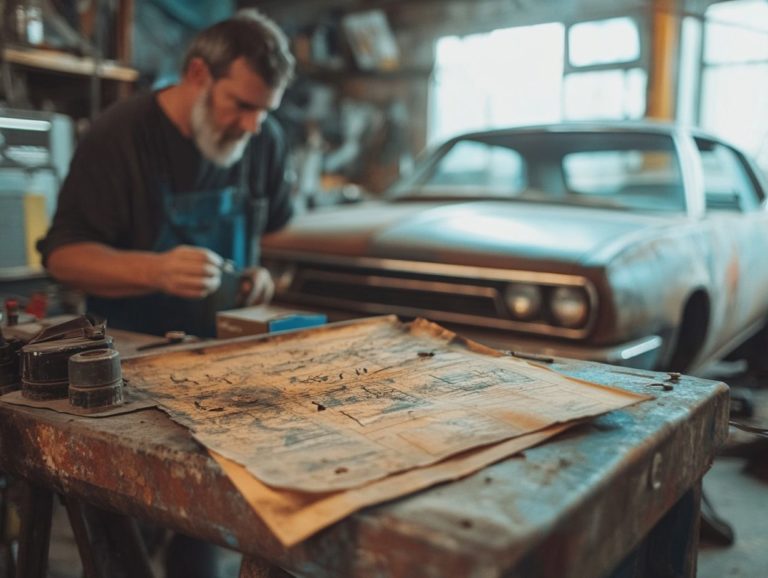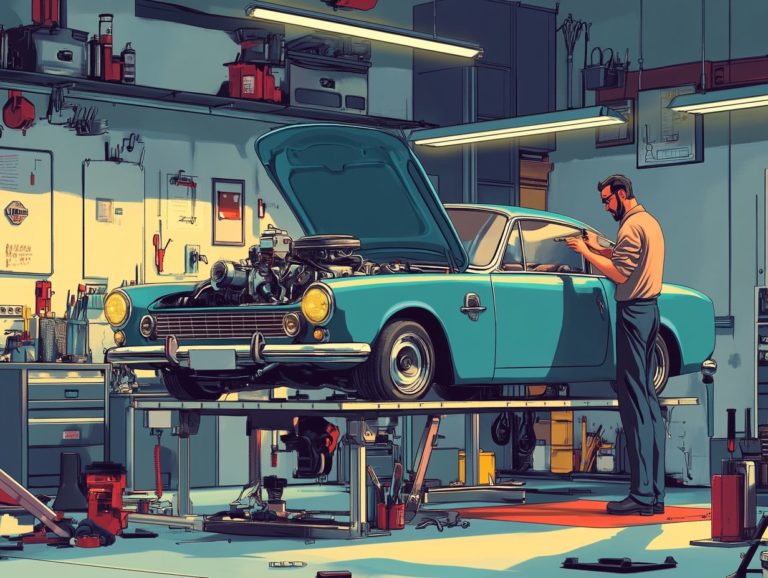5 Essential Tools for Used Car Buyers
Buying a used car can stir up a mix of excitement and anxiety. With countless options at your fingertips, it s essential for you to approach the process with both confidence and knowledge.
This article delves into five indispensable tools that every savvy used car buyer should have in their arsenal:
- Vehicle history reports
- Mechanic inspections
- Test drives
- Pricing guides
- Thorough online research
You ll discover the benefits and risks linked to purchasing a used car, along with key considerations to keep in mind during inspections and test drives. We will also share valuable tips to help you secure an outstanding deal.
Whether you re a seasoned buyer or stepping into the market for the first time, this guide will help you make smart choices fast!
Contents
- Key Takeaways:
- 1. Vehicle History Report
- 2. Mechanic Inspection
- 3. Test Drive
- 4. Pricing Guides
- 5. Online Research
- What Are the Benefits of Buying a Used Car?
- What Are the Risks of Buying a Used Car?
- How Can a Vehicle History Report Help in the Buying Process?
- What Should Be Included in a Mechanic Inspection?
- What Are the Key Factors to Consider During a Test Drive?
- How Can Pricing Guides Help in Negotiating a Fair Price?
- What Are the Most Important Things to Research About a Used Car?
- What Are the Red Flags to Watch Out for When Buying a Used Car?
- How Can One Ensure They Are Getting a Good Deal on a Used Car?
- What Are the Benefits of Buying from a Private Seller vs. a Dealership?
- Frequently Asked Questions
- What are the 5 essential tools for used car buyers?
- Why is a vehicle history report important for used car buyers?
- How can a mechanic inspection help with buying a used car?
- What are price comparison tools and why are they useful for used car buyers?
- Why is a budget calculator important for used car buyers?
- What should be included in a test drive checklist for used car buyers?
Key Takeaways:
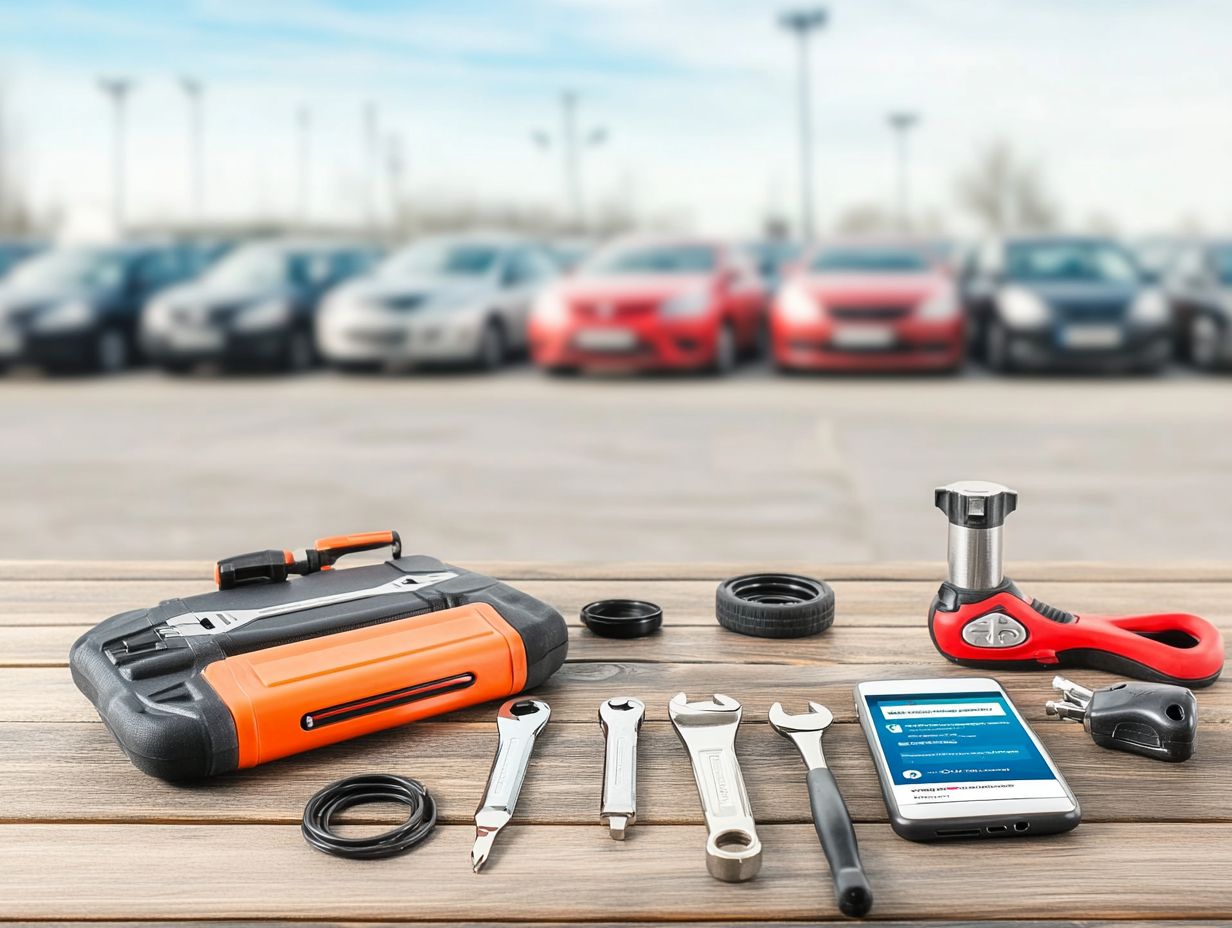
A vehicle history report helps you understand a car’s past and spot issues. Have a mechanic inspect the car to ensure it s in good shape before you buy. Test driving is vital to assess performance and comfort before making a purchase.
1. Vehicle History Report
A Vehicle History Report (VHR) is an invaluable asset when you re contemplating the purchase of a preowned vehicle. It offers essential information about the car s past, including any accidents, service history, and previous ownership.
This knowledge gives you the power to make a well-informed investment, ensuring you truly understand what you re committing to. A thorough VHR is not only crucial for your purchasing decision but also for fostering trust in the automotive market.
Within a typical VHR, you ll find critical insights like accident history, which reveals the extent of any damage the vehicle has sustained. You ll also see the title status, indicating whether the vehicle has been branded as salvage or rebuilt, along with service records detailing all maintenance performed.
For guidance on interpreting these reports and understanding their significance, you can refer to reputable sources like Kelley Blue Book. Obtaining these reports is easy; they can be accessed through various online platforms and providers, giving you the power to make confident, informed choices as you navigate the world of preowned vehicles.
2. Mechanic Inspection
A thorough inspection is essential before you purchase any used vehicle. It helps you identify potential issues that could lead to costly repairs, ensuring that you invest only in high-quality options from the available used inventory.
During the inspection, critical components like the engine, brakes, and transmission are checked to assess their condition and functionality. Mechanics will evaluate how these parts operate, ensuring that the vehicle performs safely.
Using essential tools for a car inspection can enhance your experience. These tools enable you to find trustworthy mechanics who specialize in inspections tailored to your specific needs. This not only streamlines the process but also gives you peace of mind, knowing that seasoned professionals are assessing the vehicle’s integrity before you make your purchase.
3. Test Drive
A test drive is an essential step in your vehicle acquisition journey, giving you the chance to evaluate the performance, comfort, and overall suitability of a car whether you re eyeing it for a project or as your daily driver.
During this experience, pay close attention to how the car handles various road conditions, from sharp turns to bumpy surfaces, to really get a sense of its stability.
Assess the comfort level of the driver’s seat and how easily you can reach controls and features. Stay alert for any unusual noises that could signal potential mechanical issues hiding beneath the surface.
By meticulously evaluating these aspects, you position yourself to make a wise investment and deepen your connection with the vehicle, nurturing a stronger sense of brand loyalty as you drive off into the future!
4. Pricing Guides
Utilizing pricing guides like Kelley Blue Book and NADA can be very helpful for you as a potential buyer. They empower you to negotiate a fair price for used vehicles.
This approach not only saves you money but also helps you make informed financial decisions when you step into the automotive market.
These guides provide a comprehensive view of the fair market value, allowing you to compare similar models and spot any pricing discrepancies.
For example, if you come across a car listed above its guide value, you can confidently approach the seller armed with this knowledge. This sets the stage for a more favorable negotiation.
Understanding how a vehicle loses value over time helps you assess what a realistic offer looks like. This savvy awareness shields you from overpaying and gives you the confidence to walk away from deals that don t align with market standards.
5. Online Research
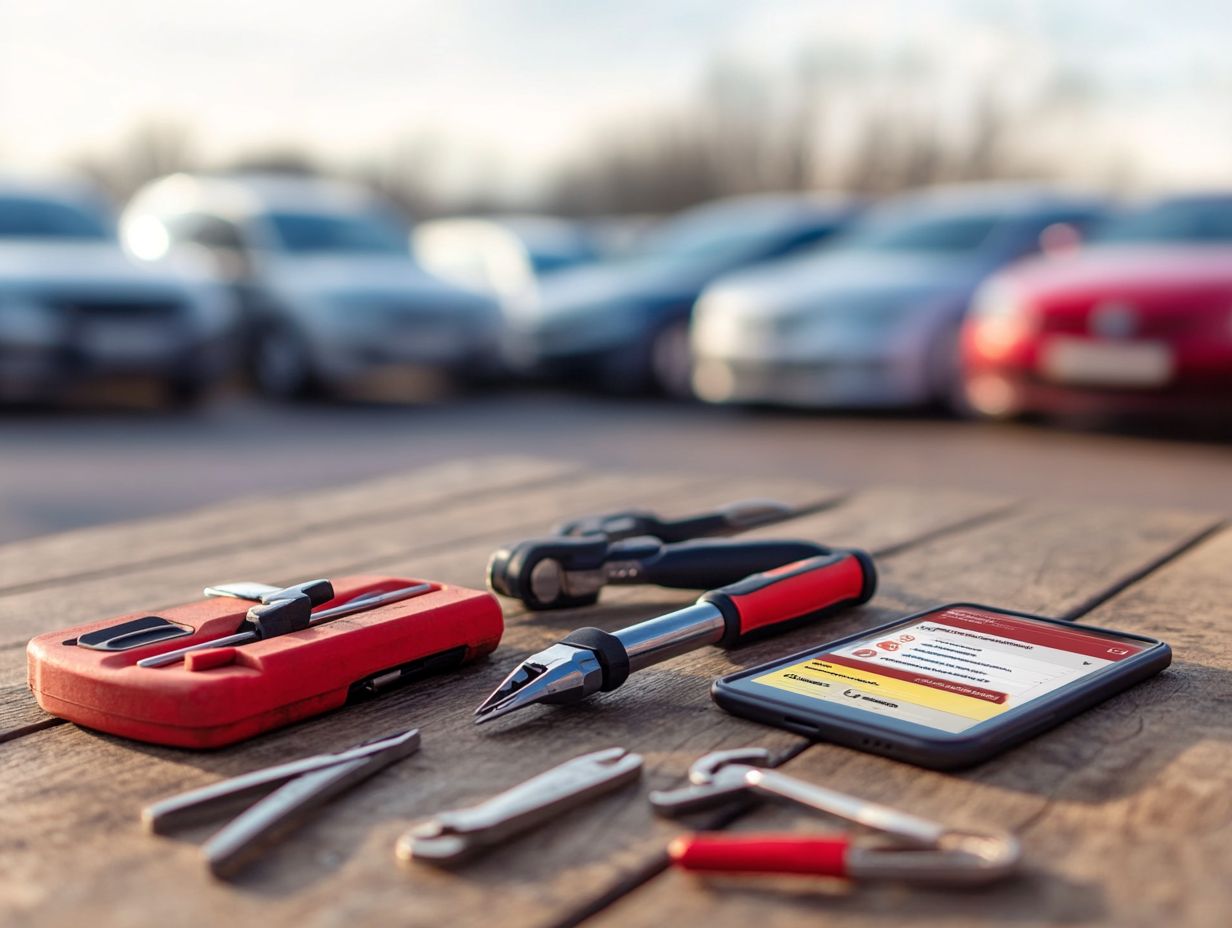
Conducting thorough online research is essential for you as a modern car buyer. It empowers you to make smart choices about used cars, especially when you consider 5 tips for buying used cars from private sellers, while leveraging digital marketing tools and automotive CRM systems.
In today’s digital landscape, you have access to a wealth of online platforms, from dedicated automotive forums to comprehensive review sites. These resources offer valuable insights from fellow buyers and expert opinions, including 5 red flags when buying a used car.
Dealers’ websites often provide detailed vehicle histories and customer testimonials, making your decision-making process even easier. By embracing technology, you can gather extensive information and compare offers.
This simplifies your shopping journey and ensures that you choose a vehicle that perfectly aligns with your needs and budget. Act now to secure the best deals!
What Are the Benefits of Buying a Used Car?
Investing in a used car offers a wealth of advantages. You can enjoy significant cost savings, seize the chance to acquire high-quality vehicles that have already undergone depreciation, and explore certified pre-owned options that frequently come with warranties.
Each of these factors enhances customer loyalty in the automotive market. This strategy helps you extend your budget while unveiling a diverse array of choices tailored to meet various tastes and needs.
Many used vehicles are celebrated for their reliability, with several models proving their endurance over time. If you seek added peace of mind, certified pre-owned programs can elevate your buying experience even further.
These programs often include complimentary inspections and maintenance plans, providing reassurance that you re making a wise investment. Ultimately, these features coalesce to make used cars an intelligent choice for the discerning shopper.
What Are the Risks of Buying a Used Car?
Buying a used car certainly has its perks, but it also comes with a set of risks, especially regarding the quality and reliability of the inventory. If you don’t tread carefully during the acquisition process, you might face unexpected expenses and dissatisfaction.
These risks can manifest in various ways, such as hidden damage that’s not immediately apparent or a sketchy history that could involve previous accidents or maintenance issues. The lack of a dealer warranty, often a comforting feature of new vehicles, can also be concerning.
To navigate this landscape effectively, thorough research is essential. You should obtain a vehicle history report to uncover any past incidents and schedule a comprehensive inspection with a trusted mechanic to identify any lurking problems.
By taking these proactive measures, you can significantly decrease the chances of running into unpleasant surprises further down the road.
How Can a Vehicle History Report Help in the Buying Process?
A Vehicle History Report is a critical asset in your car-buying journey. It offers crucial insights into a vehicle’s past, empowering you to make informed decisions. This transparency builds trust in the buying experience and enhances your loyalty as a customer.
This report includes important information, such as:
- Previous ownership records
- Accident history
- Service maintenance logs
- Any outstanding recalls
With a comprehensive view of a vehicle’s background, you can evaluate the potential for future issues and ascertain the vehicle’s true worth.
Taking this proactive approach not only empowers you as a consumer but also bolsters the credibility of dealerships that provide these reports. When you feel confident in your purchase, it cultivates a lasting relationship with the seller, ultimately driving repeat business and referrals in the competitive automotive landscape.
What Should Be Included in a Mechanic Inspection?
A comprehensive mechanic inspection should encompass a meticulous evaluation of critical components, including the engine, brakes, and electrical systems. This ensures you are making informed choices about the high-quality tools and vehicles you are considering.
During this examination, engine performance metrics, such as horsepower (a measurement of how powerful the engine is) and fuel efficiency, should be assessed. A thorough evaluation of the overall engine condition will help identify any potential issues early on.
The brake system is equally crucial. It requires inspection for wear and tear on pads and rotors, as well as a check on fluid levels to ensure safe stopping power.
Tire quality, including tread depth and alignment, significantly impacts handling and safety. By concentrating on these essential elements, you can gain a clearer understanding of the vehicle’s overall reliability, helping you avoid unforeseen repairs and guaranteeing a smoother driving experience.
What Are the Key Factors to Consider During a Test Drive?
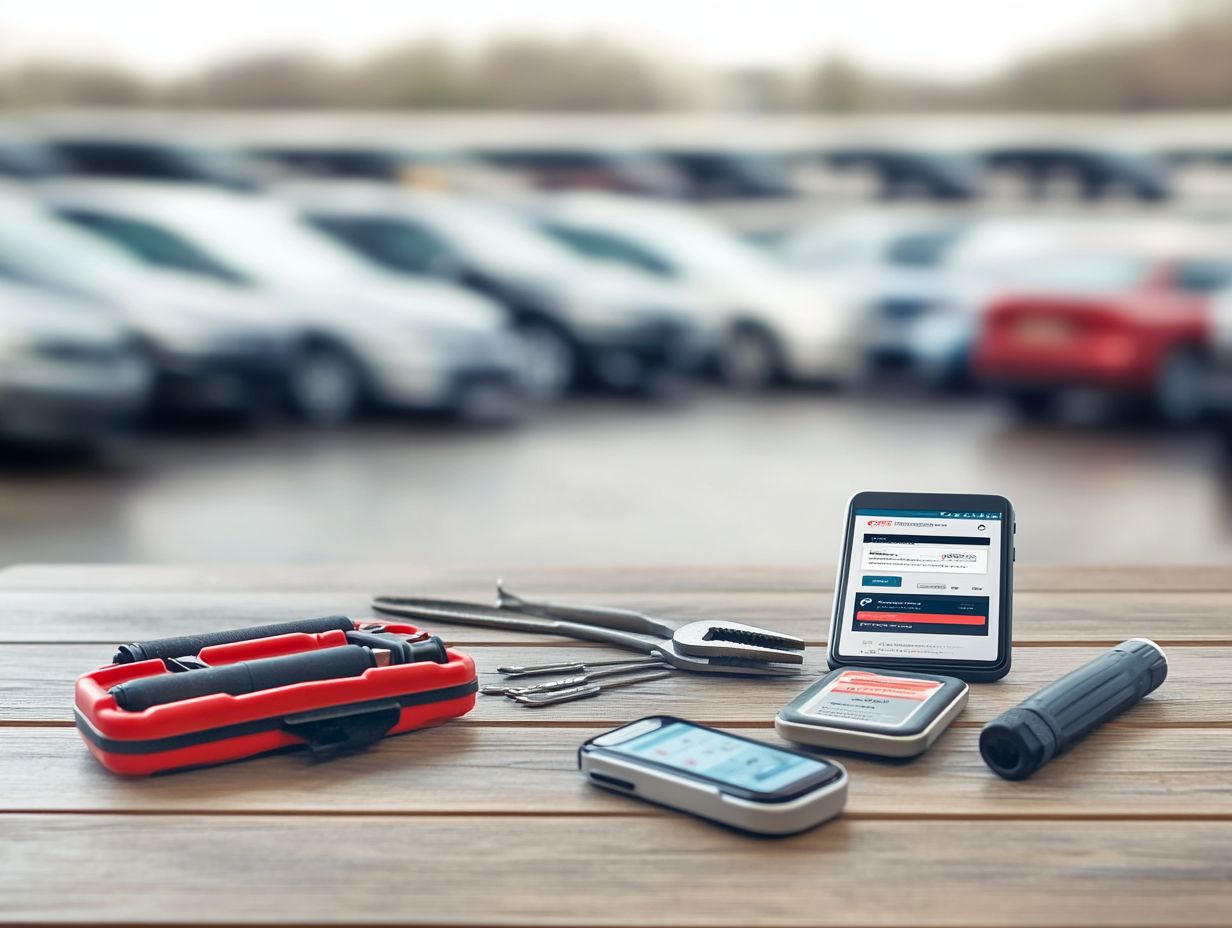
When you take a test drive, consider several key factors, such as the vehicle’s handling, comfort, and responsiveness. These elements are crucial if you envision using the car as a project vehicle or for daily commuting.
As you drive, pay attention to how the car performs on different road surfaces. Is the ride smooth, or does it feel bumpy and jarring? Visibility is another essential aspect. Make sure the layout of the mirrors and windshield offers a clear view of your surroundings, especially at intersections.
Test the brakes. Start gently, then press firmly to see how they respond. Don t shy away from interacting with features, such as the climate controls and audio system, to ensure they feel intuitive and user-friendly.
Consider how well the vehicle fits into your lifestyle. Does it accommodate your family s needs or support your hobbies?
How Can Pricing Guides Help in Negotiating a Fair Price?
Pricing guides are essential tools for you as a buyer, equipping you with the necessary information to negotiate a fair price effectively. This knowledge can help you save money on a used car purchase and make informed decisions during the vehicle acquisition process.
With up-to-date data on market trends and vehicle valuations at your fingertips, you can enter negotiations with confidence. Understanding a vehicle’s true worth enables you to point out discrepancies between the asking price and its actual market value, allowing you to leverage this information effectively in discussions.
Familiarity with comparable sales can strengthen your position for securing a better deal, making it more challenging for sellers to dismiss your offers. Entering negotiations without this knowledge not only reduces your chances of landing a reasonable price but can also lead to overpaying.
Being well-informed is key to getting a good deal.
What Are the Most Important Things to Research About a Used Car?
When researching a used car, it s crucial to focus on key elements like the vehicle’s history, maintenance records, and common issues linked to the model.
These factors can significantly influence your experience, particularly if you’re considering it as a project car. Diving into vehicle history reports can reveal essential details about past accidents or title issues that might cause headaches later on.
Examining consumer reviews lets you gauge the overall satisfaction of others who have owned the same model, offering valuable insights into its durability and performance.
Understanding typical mechanical issues prepares you for potential repairs and instills confidence in your purchase.
Doing thorough research helps you build loyalty people who know what they’re doing are more likely to buy from you again and minimizes the risk of unexpected challenges down the road.
What Are the Red Flags to Watch Out for When Buying a Used Car?
Identifying red flags when buying a used car is essential for steering clear of potential pitfalls. For instance, if you hear unusual noises during a test drive or notice incomplete service records, these could hint at deeper mechanical issues lurking beneath the surface.
You should also be vigilant about mismatched VIN (Vehicle Identification Number) numbers on different parts of the vehicle, as this can suggest unauthorized repairs or, worse, that the car may have been stolen.
Checking for rust is crucial too especially in hidden spots like the wheel wells or undercarriage since it could indicate severe structural problems that will be costly to address later.
Signs of poor maintenance, such as worn-out tires or a dusty engine bay, often reveal neglect that you definitely want to avoid.
You can avoid these issues by conducting a thorough inspection, utilizing vehicle history reports, and seeking pre-purchase inspections from trusted mechanics.
How Can One Ensure They Are Getting a Good Deal on a Used Car?
To ensure you’re securing a great deal on a used car, it’s vital to blend comprehensive research, savvy negotiation techniques, and a solid grasp of the vehicle’s market value, much like the 5 steps to prepare for buying a new car.
This approach not only saves you money but also cultivates a positive customer relationship.
Begin by gathering recent sales data for comparable makes and models in your area; this information will serve as your foundation in any discussions.
Don’t overlook online platforms that offer valuation tools to enhance your understanding.
As you enter negotiations, maintain a calm and confident demeanor, clearly pointing out any inconsistencies you’ve discovered between the seller’s asking price and the current market value.
Building a good relationship with the seller can really pay off! It encourages them to be more flexible on price. By being informed and respectful, you create a win-win scenario for both parties.
What Are the Benefits of Buying from a Private Seller vs. a Dealership?
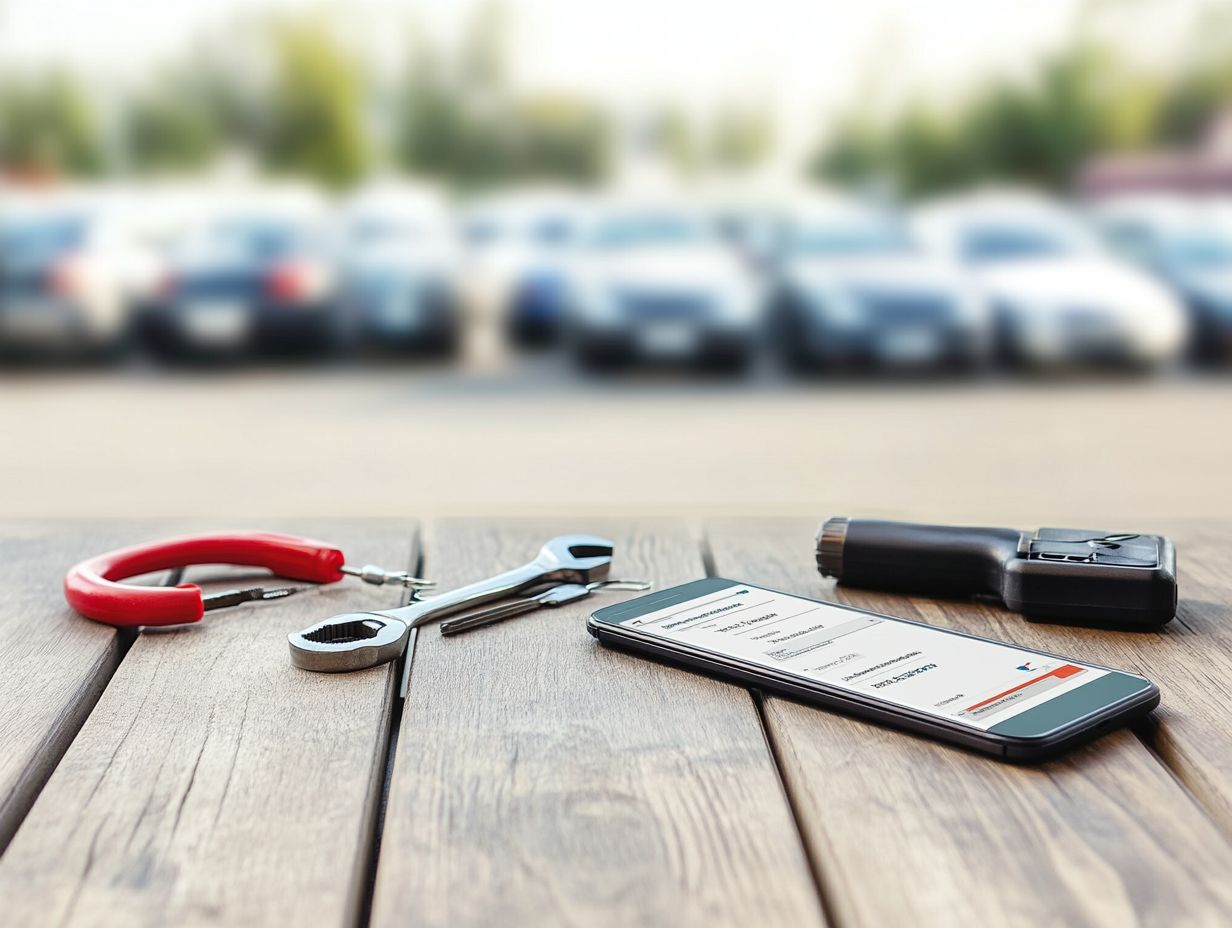
Purchasing a vehicle from a private seller can offer distinct advantages over buying from a dealership. You might find lower prices, enjoy personalized service, and experience greater flexibility in negotiation all factors that can significantly enhance your loyalty as a customer.
While private sales can certainly provide financial perks, it s crucial to weigh the potential drawbacks. One key concern is the absence of warranties or consumer protections that dealerships typically offer.
Dealerships often provide a more reliable experience, presenting certified used vehicles that come with guarantees, which can be especially appealing if you prioritize safety in your buying decision.
The established reputation of a dealership can provide a sense of reassurance, while private transactions may carry an element of unpredictability. In the end, your choice between these options will hinge on your individual priorities, weighing the potential savings and personal touches of private sales against the security and support that dealerships bring to the table.
Frequently Asked Questions
What are the 5 essential tools for used car buyers?
The 5 essential tools for used car buyers are a vehicle history report, a mechanic inspection, price comparison tools, a budget calculator, and a test drive checklist.
Why is a vehicle history report important for used car buyers?
A vehicle history report reveals key details about a used car’s past. This includes accidents, ownership history, and maintenance records. Buyers can use this information to make informed decisions and avoid costly issues.
How can a mechanic inspection help with buying a used car?
A mechanic inspection is a detailed check by a professional. It uncovers any existing or potential problems, giving buyers peace of mind about their investment.
What are price comparison tools and why are they useful for used car buyers?
Price comparison tools let buyers see prices of similar used cars in their area. This helps them assess if a car’s price is fair and aids in negotiating a better deal.
Why is a budget calculator important for used car buyers?
A budget calculator helps buyers figure out how much they can afford. It considers their income, expenses, and financing options, preventing overspending and financial troubles.
What should be included in a test drive checklist for used car buyers?
A test drive checklist should cover unusual noises, vehicle functions, and the condition of tires, brakes, and suspension. Bringing a friend or family member for a second opinion can be very helpful.

